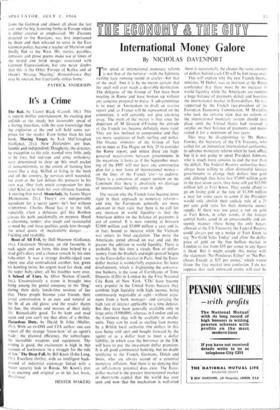It's a Crime
The Bait, by Lionel Black (Cassell, 18s.). This is superb thriller entertainment. Its exciting plot unfolds at the steady but inexorable speed of a fizzing time-fuse, with the sure knowledge that the explosion at the end will hold some sur- prises for the reader. Even better than his last book. Moving Target, by Jack McClenaghan (Gollancz, 21s.). New Zealanders are lean, laconic and independent: Dougherty, the deserter, no exception to the rule, wanted very little, only to be free, but red-tape and army orthodoxy
ere determined to clear up this small pocket of nonconformity to the extent of hunting him down like a dog. Skilled at living in the bush and off the country, he survives until wounded, but even at the last defeats his pursuers in his own way. One feels much compassion for this rebel Kiwi as he finds his own ultimate freedom. A moving first novel. Shamelady, by James Mayo (Heinemann, 21s.). There's one indispensable ingredient for a secret agent--he's lost without SFIXPERTISE. Charles Hood has it to the full, especially when a delicious girl like Bonbon crosses his path. accidentally on purpose. Hood is charming, tender; also tough and resourceful as need be, and these qualities guide him through the usual quota of incalculable danger. . . . Exciting and readable.
Root of All Evil, by Dell Shannon (Gollancz, 18s.). Lieutenant Mendoza, an old favourite, is back again and on form, this time helped by a dead girl's diary and a chance remark by his own baby-sitter. It was a strange double-edged case where one clue contradicted another, but, given his howling twins, his urgent need for sleep, and the super baby-sitter, all his troubles were over. A School of Liars, by Olive Norton (Cassell, 16s.). Unconsciously a crime is brought into being among the genial company in the 'Dog,' during their daily lunch-time sessions of liar dice. These people become your friends, their jovial conversation is as easy and natural as the fit of an old glove, and the reader shares the fun, the strains and stresses of their daily life. Remarkably good. To be kept and read again and you can't say that often of a thriller. Hazardous Duty, by David St John (Muller, 18s.). With an ex-OSS and CIA author, one can expect all the strange 'know-how' of an agent's trade : the planned efficiency, the subterfuges, the incredible weapons and equipment. The writing is good, the excitement is high in this account of lawlessness 'in a struggle for the rule of law.' The Deep Fall, by Bill Knox (John Long, I5s.). Excellent thriller, with an intelligent back- ground of industrial espionage linked with a major security leak to Russia. Mr Knox's plot is as exciting and original as in his last book, Derilweed.
HESTER MAKEIG






























 Previous page
Previous page